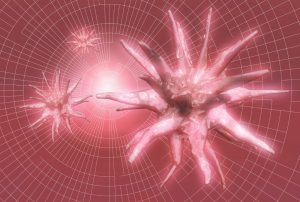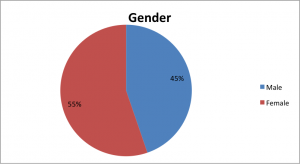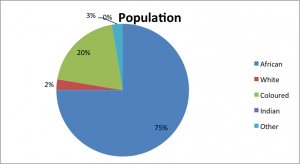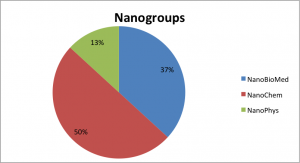MSc Nanoscience Postgraduate programme growing in leaps and bounds
NPEP Newsletter, March 2016
 Following on the success of new research centres in nanoscience and nanotechnology established by the Department of Science and Technology, the next major step was to introduce a dedicated postgraduate programme for training in nanoscience and nanotechnology in South African Universities.
Following on the success of new research centres in nanoscience and nanotechnology established by the Department of Science and Technology, the next major step was to introduce a dedicated postgraduate programme for training in nanoscience and nanotechnology in South African Universities.
This programme also marked the introduction of a new system of collaboration between universities, where four South African universities are simultaneously presenting the same master’s degree.
Since 2012, a Master’s programme in nanoscience and nanotechnology has been offered in collaboration between the University of Johannesburg (UJ), Nelson Mandela Metropolitan University (NMMU), University of the Free State (UFS), and the University of the Western Cape (UWC).
As the study of nanomaterials, nanoscience and nanotechnology exists at the overlap between biology, chemistry and physics, students from all these fields will register for the same degree – a new concept in advanced research in South Africa.
The programme comprises three aspects: introductory courses in the wider aspects of nanoscience, courses in advanced nanoscience studies in the respective study fields, and a research thesis on a nano-study project.
The coursework component is completed at the University of the Western Cape, thereafter the students will continue their research projects at their home university campuses. Frequent movement between the different campuses is a feature of the programme.
Prof Dirk Knoesen PhD (UStell), Emeritus Professor in Physics and the Director of the Nanoscience Platform, noted how the centre had made huge strides in empowering graduates. “The presence of the centre has ensured we can constantly produce well trained and knowledgeable personnel. The inter collaboration between universities also ensures students have the best equipment to use in SA.”
Outline of the programme
Each student takes two short courses to introduce them to nanoscience and nanotechnology, plus an introductory course in each of the two fields which differ from their own study field. For example: chemistry students take two introductory courses, one in nanophysics and one in nanobiology. Students then proceed to advanced courses in their own study field. For example: chemistry students do advanced courses in nanochemistry.
Although all the course components will be presented at UWC, lecturers from all four universities are participating in the courses. A number of international scholars are also contributing to the programme.
On completion of the coursework, the students return to their home campuses where they do a research project under a local supervisor, culminating in a Master’s thesis.
The duration of the course component is nine months, followed by the research project for a minimum of 15 months at the home campus. Students will complete the MSc degree in Nanoscience in a minimum of 2 years.
Modules:
Core Modules:
- Central Concepts in Nanoscience
- Management for Nanoscientist
Nanochemistry Group:
- Foundation of Biomedical Science for non-biologists
- Foundations of Nanophysics for non-physicists
- Advanced Nanochemistry
- Experimental Techniques in Nanochemistry
Nanobiomedical Science Group:
- Foundation of Nanochemistry for non-chemists
- Foundations of Nanophysics for non-physicists
- Advanced Nanobiomedical Science
- Experimental Techniques in Nanobiomedical Sciences
Nanophysics Group:
- Foundation of Biomedical Science for non-biologists
- Foundation of Nanochemistry for non-chemists
- Advanced Nanophysics
- Experimental Techniques in Nanophysics
Financial Aspects
A full scholarship is provided, which includes all registration, tuition and on-campus accommodation costs. An annual allowance to assist with personal costs is provided, as well as an allowance to cover the purchase of books and a laptop.
STUDENTS and OUTPUT
A statistical analysis on all the students registered in the programme is attached below. This provides information on the gender and equity, institutions and study fields per year, plus an overall summary.
Total Registration per year:
- 2012: 21 students
- 2013: 31 students
- 2014: 24 students
- 2015: 25 students
Students Graduated to date (Nov 2015)
Total graduated: 47 students
- 2012: 20 out of 21 graduated (one student experienced personal problems, not yet completed)
- 2013: 27 out of 31 graduated (3 in 2016 and 1 excluded due to poor performance)
- 2014: 24 registered, currently busy and completing their research projects
- 2015: 25 registered, currently busy with their research projects
Other output (from the graduated cohorts for 2012 and 2013) Student Publications:
- 17 publications in peer-reviewed journals
- 6 non-reviewed publications
Student Attendance/Participation in Conferences:
- 8 Local conference attendance only
- 25 Local conference papers/posters delivered
- 21 International conference held in SA attended and papers delivered
- 6 International conference overseas attended and papers delivered
Other output (from the graduated cohorts for 2012 and 2013)
Further education:
- 25 register for doctoral studies in SA
- 3 register for doctoral degrees internationally (Sweden, USA, France)
- 5 took on jobs (based on information received to date)
Awards:
- 5 Best conference prizes
- 2 Golden Key awards
- 1 Fulbright Scholarship to the USA
FOUR YEARS OF STUDENT STATISTICS



Nanotechnology within nanomedicine
Science and Technology Minister opens nanomaterials facility
The solution to neurodegenerative diseases
MSc Nanoscience Postgraduate programme growing in leaps and bounds
1st Symposium on Nanomedicine and Malaria in South Africa
7th World Nano Conference (Nano2016)
DST-NRF Nanotechnology Symposium
The 6th International Conference on Nanoscience and Nanotechnology in Africa
Nanotech France 2016 International Conference & Exhibition
Science Communication Training Programme for Female Scientists and Researchers
Science Communication Training and FameLab Heat in different provinces
